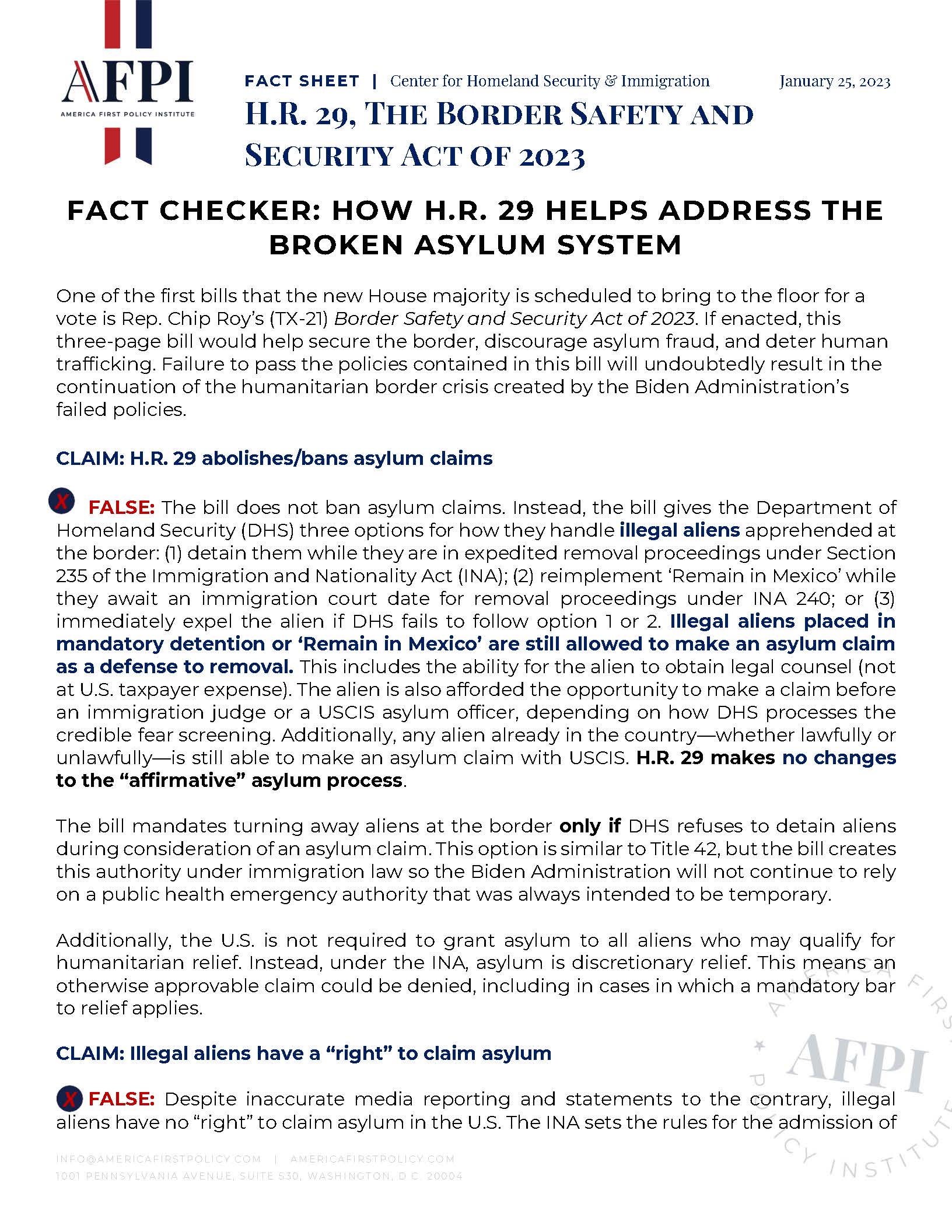Fact Sheet - H.R. 29, the Border Safety and Security Act of 2023
fact checker: How H.R. 29 Helps Address the Broken Asylum System
One of the first bills that the new House majority is scheduled to bring to the floor for a vote is Rep. Chip Roy’s (TX-21) Border Safety and Security Act of 2023. If enacted, this three-page bill would help secure the border, discourage asylum fraud, and deter human trafficking. Failure to pass the policies contained in this bill will undoubtedly result in the continuation of the humanitarian border crisis created by the Biden Administration’s failed policies.
CLAIM: H.R. 29 abolishes/bans asylum claims
FALSE: The bill does not ban asylum claims. Instead, the bill gives the Department of Homeland Security (DHS) three options for how they handle illegal aliens apprehended at the border: (1) detain them while they are in expedited removal proceedings under Section 235 of the Immigration and Nationality Act (INA); (2) reimplement ‘Remain in Mexico’ while they await an immigration court date for removal proceedings under INA 240; or (3) immediately expel the alien if DHS fails to follow option 1 or 2. Illegal aliens placed in mandatory detention or ‘Remain in Mexico’ are still allowed to make an asylum claim as a defense to removal. This includes the ability for the alien to obtain legal counsel (not at U.S. taxpayer expense). The alien is also afforded the opportunity to make a claim before an immigration judge or a USCIS asylum officer, depending on how DHS processes the credible fear screening. Additionally, any alien already in the country—whether lawfully or unlawfully—is still able to make an asylum claim with USCIS. H.R. 29 makes no changes to the “affirmative” asylum process.
The bill mandates turning away aliens at the border only if DHS refuses to detain aliens during consideration of an asylum claim. This option is similar to Title 42, but the bill creates this authority under immigration law so the Biden Administration will not continue to rely on a public health emergency authority that was always intended to be temporary.
Additionally, the U.S. is not required to grant asylum to all aliens who may qualify for humanitarian relief. Instead, under the INA, asylum is discretionary relief. This means an otherwise approvable claim could be denied, including in cases in which a mandatory bar to relief applies.
CLAIM: Illegal aliens have a “right” to claim asylum
FALSE: Despite inaccurate media reporting and statements to the contrary, illegal aliens have no “right” to claim asylum in the U.S. The INA sets the rules for the admission of aliens into the U.S. An alien who arrives at the border—including a port of entry—without a visa or other valid entry document is inadmissible under INA 212(a)(7). Any alien who crosses the border illegally is inadmissible under INA 212(a)(6). Additionally, any alien who was previously removed from the country is inadmissible for five years under INA 212(a)(9). All of these aliens are removable from the U.S., but they may raise an asylum claim as a defense to stop the deportation. Only aliens who meet the INA definition of “refugee” qualify for asylum and are allowed to remain in the country.
INA 101(a)(42) defines “refugee” as “any person who is outside any country of such person’s nationality… and who is unable or unwilling to avail himself or herself of the protection of that country because of persecution or a well-founded fear of persecution on account of race, religion, nationality, membership in a particular social group, or political opinion.”
Trying to escape economic hardship, poverty, gang violence, domestic violence, or general fear of criminal conduct is not grounds for asylum. As a result, only 15% of the illegal aliens who claim asylum at the southern border qualify for humanitarian relief, and 40% fail to even file an asylum claim once released into American communities.
CLAIM: Turning away illegal aliens at the border violates international humanitarian obligations
FALSE: Neither the 1951 U.N. Convention nor the 1967 Refugee Protocol is directly enforceable in U.S. law, but some of their obligations have been implemented through new laws and regulations. In April 2018 guidance, the United Nations High Commissioner for Refugees affirmed that “refugees do not have an unfettered right to choose their ‘asylum country.’” For the better part of the last decade, as “credible fear” claims significantly increased, nearly all of the aliens apprehended at the southern border crossed through at least one other country where they could have sought humanitarian relief, including Mexico. Instead of seeking relief in the first safe country they passed through, which would be expected if they were genuinely fleeing persecution, these aliens are choosing to come to the U.S. for economic and family reunification reasons.
CLAIM: H.R. 29 harms border communities
FALSE: The asylum system is being exploited because of the Biden Administration’s policy of releasing illegal aliens who claim credible fear or asylum into American communities. Border communities are overwhelmed as they lack the resources and capacity to handle the record number of illegal aliens released into these communities. Specifically, these illegal aliens are overfilling shelters, draining local emergency resources, and burdening schools before they move on to other American communities. Again, only around 15% of these aliens qualify for asylum, and the remainder disappear into American communities, take jobs from Americans, and have a very low likelihood of being deported. H.R. 29 would not harm border communities but would instead address the serious issues they are currently facing.
